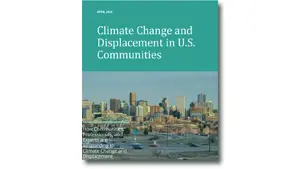 EcoAdapt conducted a survey with the Strong, Prosperous, and Resilient Communities Challenge (SPARCC) to determine if and how people working to address displacement pressures are considering the effects of climate change. This survey is part of a broader project in collaboration with the Urban Displacement Project to better understand the intersections between climate change and displacement pressures.
EcoAdapt conducted a survey with the Strong, Prosperous, and Resilient Communities Challenge (SPARCC) to determine if and how people working to address displacement pressures are considering the effects of climate change. This survey is part of a broader project in collaboration with the Urban Displacement Project to better understand the intersections between climate change and displacement pressures.
Climate change is playing a bigger role in determining where and how we live, and is limiting access to and availability of affordable healthy housing, healthy food choices, transportation choices, and social networks, which is forcing displacement of individuals and communities. Displacement—whether temporary or permanent, forced or voluntary—is an issue rooted in inequity and exacerbated by climate change.
Climate change poses significant threats to the physical, cultural, spiritual, social, and economic displacement of communities around the world. It is also causing increasing mental and emotional distress or solastalgia—the loss of sense of place or identity. In some cases, the improvements made to communities to help them adapt to climate change may exacerbate gentrification, leading to rising housing costs and rents and redevelopment, squeezing the most vulnerable communities into living conditions that are even less equipped to bounce back if a natural disaster were to occur.
This survey’s objectives were to identify:
- To what degree anti-displacement practitioners are thinking about climate change in their work;
- Emerging practices and policies that may address the dual goals of reducing climate risks and displacement pressures; and
- Needs, opportunities, and barriers in reducing climate risks and displacement pressures in communities.
Key findings included:
- Eighty-eight percent of respondents indicate that their community is experiencing moderate to significant development or redevelopment pressure.
- Ninety-one percent of participants agree that climate change is having or is likely to have a significant effect on their communities.
- Day-to-day issues such as the availability of affordable housing, fair housing opportunities, rising property values, displacement risks, and cost of living rank highly among all respondents, followed by climate change stressors and impacts—storms and extreme weather events, extreme heat events, flooding, drought, sea level rise, and wildfire.
- Of the climate issues ranked among those about which respondents are very concerned are storms and extreme weather events, extreme heat events, flooding, increasing air temperatures, sea level rise, drought, and wildfire. Among respondents from states engaged in the Strong, Prosperous, and Resilient Communities Challenge, wildfire only registers as a major issue of concern for western states such as Colorado and California. Flooding ranks as the most frequently expressed concern for respondents from Tennessee, while extreme heat events and storms are the most frequently expressed concerns by respondents in Georgia and Illinois.
Click here to view the resource.




